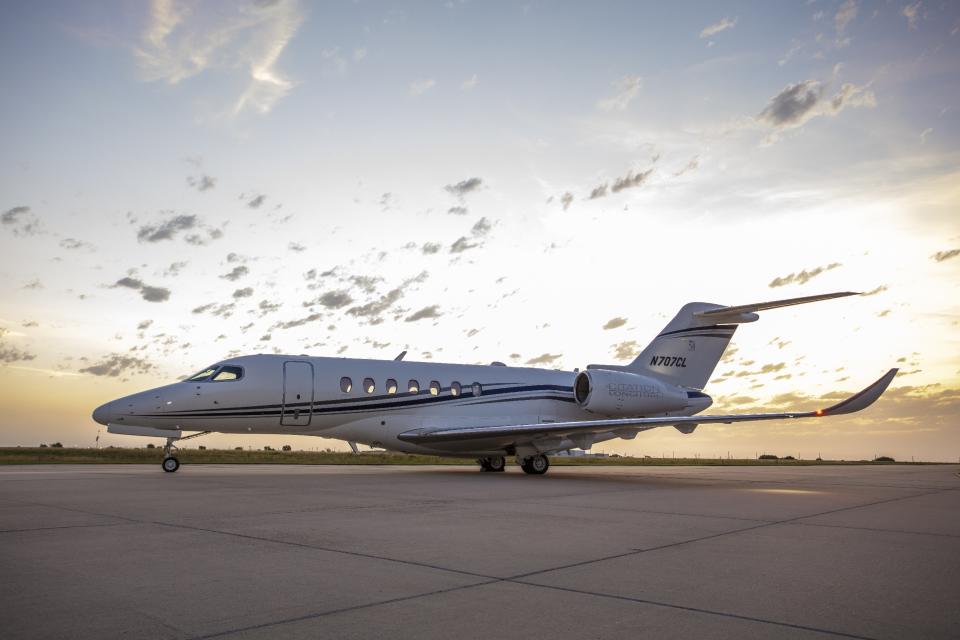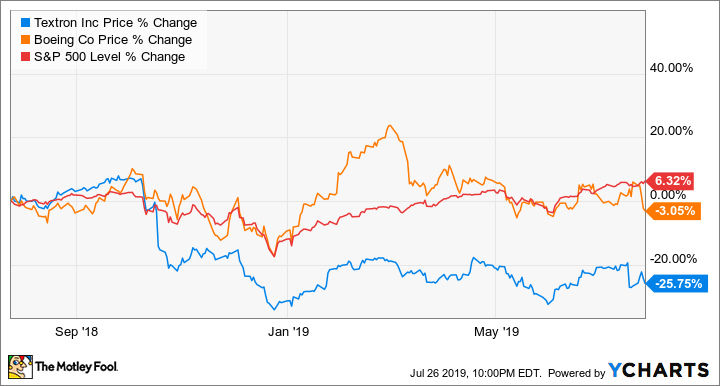Better Buy: Boeing vs. Textron
Boeing (NYSE: BA) and Textron (NYSE: TXT) have both stumbled over the past year, with Boeing struggling to work through significant issues with its much-ballyhooed new commercial aircraft, and Textron dealing with operational hiccups in key units. But even with these issues, both companies have significant strengths that may entice investors to look past the bad and buy in.
Both Boeing and Textron delivered messy second-quarter earnings reports in late July, and both stocks reacted poorly as a result. But is either one a good choice for a long-term focused investor? Here's a look at the prospects for both Boeing and Textron to determine which, if either, is a better buy today.
TXT and Boeing data by YCharts.
Boeing's clipped wings
Boeing boasts a sprawling portfolio of commercial and defense aerospace products, but for the time being, all eyes are focused on the company's troubled 737 MAX aircraft. The hot-selling MAX was grounded after a March incident in which an Ethiopian Airlines flight crashed, killing all 157 people on board. It's now four months after the crash, and we still don't know when the MAX will fly again.
Boeing has deservedly taken a lot of heat from regulators and the press following the crashes and has faced questions about the company's internal processes. Customers including American Airlines Group and Southwest Airlines are growing increasingly impatient, with Southwest removing the MAX from its schedule until at least January 2020.

Boeing's 737 MAX in flight. Image source: Boeing.
For now, the company continues to make the plane but has reduced its production rate to 42 frames per month, down from a planned 52. As many as 500 737 MAX planes are being stored around the globe at an estimated cost of about $2,000 per month per plane, with Boeing likely to have to foot a good bit of that bill plus provide compensation to victims and cover airline expenses resulting from the flight cancellations. Boeing has already taken a $5.6 billion charge related to the troubles, and that number is likely to go higher.
Boeing and regulators are working on a fix, and if past aviation disasters are any guide, it seems likely this storm will eventually pass. Boeing and archrival Airbus both have healthy order books, meaning that if a Boeing customer decides to dump a MAX order, it would have to wait years to get comparable planes from Airbus. But the troubles with the MAX are unlikely to be forgotten, and Boeing has clearly suffered reputational damage.
Boeing has faced image hits in other areas as well. In 2018, the company received a rare public rebuke from the Pentagon that led to a management overhaul of the defense unit. Earlier this year, after Boeing finally delivered its behind-schedule and over-budget Air Force refueling tanker, the government was forced to ground the planes because inspectors found tools and other debris left inside.
There is still a lot to like about Boeing's product portfolio, including the 787 Dreamliner commercial franchise, the 737, which until recently was the gold standard for short-haul flights, and a defense unit that includes planes, helicopters, drones, and more recently, autonomous submarines. But as long as the MAX dominates the headlines, those strengths are likely to be overshadowed.
Can Cessna get airborne for Textron?
While it's nowhere near the high-profile nightmare Boeing is facing with the MAX, Textron had its own aerospace issues in the recently completed quarter. Textron shares fell more than 7% on July 17 after the company released second-quarter revenue that was below expectations due to weakness in its aviation unit.
Aviation sales fell 12% in the second quarter to $1.123 billion due to lower volumes, with the company delivering 46 business jets and 34 turboprops, compared to 48 bizjets and 47 turboprops during the second quarter of 2018. The unit's book-to-bill ratio was a tepid 0.92 times, raising questions about future quarter sales.
The results continued a disturbing pattern for Textron, which has underperformed the S&P 500 by more than 30 percentage points over the last year as it announced a series of underwhelming earnings reports. The culprit inside the conglomerate has changed over time, with issues at its snowmobile unit causing trouble last year.
Textron's portfolio also includes Bell helicopters and a range of specialty vehicles, but it needs Cessna to take off if it is really going to reach cruising altitude. The company should get a boost if Cessna's new Citation Longitude midsized business jet receives certification as expected in the current quarter, giving the company a refreshed product to sell into an expected business jet market recovery.

Texton's Citation Longitude. Image source: Textron.
Cessna is also continuing development on the 19-seat SkyCourier turboprop -- which already landed FedEx as a launch customer -- and the single-engine Denali turboprop designed for fractional and charter operators. Bell also has some promising prospects on the military side and expects strong commercial demand for its 525 helicopter.
The problem is that given the number of earnings surprises in recent years, investors are increasingly seeing the company as a "show me" story and watching from the sidelines.
And the better buy is...
Both stocks offer reasons to be tempted as well as reasons to stay away. Boeing has an impressive collection of commercial and defense assets, and despite the ongoing issues with the MAX given the duopoly nature of the commercial airplane business and Airbus' equally massive order book, the logical bet remains that over the long run, Boeing will be fine. Textron, meanwhile, seems to be ironing out its biggest operating issues and should be selling into an improving bizjet market in the quarters to come.
However, Boeing management's reaction to and handling of the MAX crisis does not inspire confidence. And given the troubles the company has experienced elsewhere, the mismanagement here does not seem like a one-off. I have a hard time buying into a company where I don't have faith in management. Textron is also a relative bargain among large aerospace companies, priced at less than 10 times earnings and under one times sales. Boeing, by comparison, is still up more than 6% year to date despite the MAX issues.
I think there are better companies to buy in both the defense and commercial aerospace sectors, but between the two, I'd rather buy Textron than Boeing right now. Textron's problems seem much more manageable, and its valuation is much more reasonable. There is at least a chance Textron shares will reward those willing to buckle up and ride through some turbulence before Boeing gets the MAX in full production again.
More From The Motley Fool
Lou Whiteman has no position in any of the stocks mentioned. The Motley Fool owns shares of and recommends FedEx and Southwest Airlines. The Motley Fool recommends Textron. The Motley Fool has a disclosure policy.
This article was originally published on Fool.com

 Yahoo Finance
Yahoo Finance 
